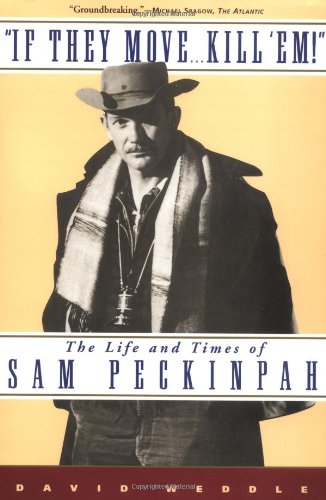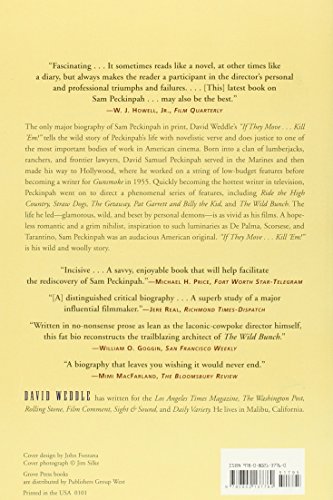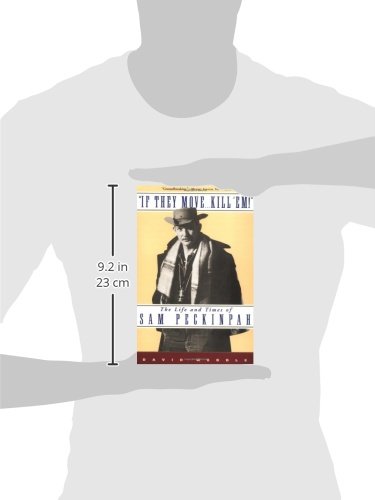Customer Services
Copyright © 2025 Desertcart Holdings Limited




If They Move . . . Kill 'Em!: The Life and TImes of Sam Peckinpah
K**N
Exposes the True Tragic Sam Pekinpah
First I thought the book was a top notch read. I finished it in a day and a half. I have been a Peckinpah fan for years, and in truth had not seen all his works. The book did several things for me:1)It prompted me to acquire, by TVO and by purchase, those works by the man I had not seen. Last night I watched one of the episodes of the Rifleman, that was written and directed by Peckinpah. His influence was evident. I purchased and watched for the first time, The Getaway, and rewatched Straw Dogs, (which I had seen in theatrical release), Cross of Iron, and the Wild Bunch and Major Dundee in director's cut. The book gave me a much better appreciation of those works, by expanding my knowledge of what was going on behind the camera.2) It gave me a much better appreciation of how movies get made in Hollywood by giving a glimpse of the process of conception, production, filming and distribution. Albeit the process has changed, (and not for the better, movies better make it thier first weekend or off to the video shelves they go!), the book documents the period during which the old studio system was dying and the new young independent directors and production companies were being born.Peckinpah was like one of the old dinosaurs holding on during the start of the Cretaceous with the mammals named Speilberg and Lucas nibbling at his emaciated drug and alcohol saturated limbs.3) It let me see the true demons that killed Peckenpah. The similarities with Elvis and more recently Michael Jackson are evident. The demons that haunted Peckinpah were not in his head, they were all around him. They are called enablers. Peckinpah was obviously Bi-polar, but like so many in our society today, nobody wanted to mention the M word. Peckinpah was mentally ill. He self medicated with alchohol and later cocaine. I was married to a Bi-polar woman and Peckinpah had the textbook symptoms: mercurial mood swings; inability to form lasting relationships in the face of deep emotional needs, instead forming corrosive and self destructive co-dependancies; promiscuous sexual practices (filling the emotional void with sex); episodes of violence against loved ones; indifference to ones children except as emotional support,(in a role reversal, the parent relies on the child for emotional support rather than the other way around, witness Angelina Jolie's sick reliance on her children as emotional props. BP suffers will continue to have or acquire more children as the older ones cease to rely on the parent, continually filling the emotional need with more children) inability to handle stress and resorting to on again off again drug and alcohol abuse.The author even mirrored my own observations of my wife, pointing out that Peckinpah could at time stop drinking for days at a time, like it was some sort of laudable attribute. I used to say the same things. In truth, those few periods when he didn't need the alcohol, were probably those brief periods between mania and disphoria when the voices in his head were quiet.The book was like reading about my five year hell in a marriage that collapsed under the weight of my wife's illness. In truth, nobody could have saved Peckinpah, but Peckinpah, but like Howard Hughes, no one told him what was wrong with him.Peckinpah's entourage of enablers, from his personal assistants/mistresses to the flunkies on the sets purveying alcohol to his stronger more capable drinking buddies, killed him. Sorry to say that most of his hard drinking protegee's are dead, Brian Keith, William Holden, Warren Oates, Ben Johnson, and a host of others. It is too bad no one ever saw Peckinpah's demons for what they were. A simple prescription of lithium or depicote might have saved him, but he fell victim to the old BS that an artist must suffer for their art and no one around him was strong enough to get him help.One warning about the book, you will never see Hollywood or the movies coming out of it the same again. It will also open your eyes to current similarities; Mel Gibson and Anjelina Jolie come to mind.
B**M
The Man Behind The Squibs
Sam Peckinpah didn't direct Hollywood classics. He directed raw, flawed, mesmerizing movies that tapped into the savage, bleeding heart of man. It was an art fueled by a life on the edge, seeking both epiphany and self-destruction. The latter came much easier.David Weddle's 1994 biography charts Peckinpah's journey from television journeyman to celebrated auteur to washed-up coked-out has-been with obvious humanity and a clear-eyed appreciation for what Peckinpah brought to the cinematic table. Beginning with his 1969 milestone "The Wild Bunch", Peckinpah revolutionized the language of film with slow-motion, cross-cutting, and rapidfire editing, usually in sequences with much violence. "Blood ballets", they were called, and "Bloody Sam" was the guy who made them."With his cameras Peckinpah sought to penetrate the primitive heart of the violence, to capture both its seductiveness and its horror," Weddle writes.But this hard-earned success of Peckinpah's was short-lived. He made a number of brilliant films in the years right after "The Wild Bunch"; arguing which, if any, are actually better than "Bunch" is the Peckinpah fan-club handshake. But Weddle notes that Peckinpah's many personal demons, fueled by alcohol and, later, cocaine, not to mention a circuitous trail of women, pushed him to a point where the films became ill-focused, "plagued by gaps in continuity, sudden lurches in tone, and scenes that were sloppily bad." The man who worked out "Wild Bunch's" amazing finale on the set devolved into a fuzzy-headed drunk.Weddle may be better known to you, as he was to me coming in, as one of three Peckinpah authorities, known as the "Peckinpah Posse", who offer commentaries on select DVDs of Peckinpah movies. I always found Weddle to be the closest in line with my own thoughts of Peckinpah, appreciative but not worshipful of the man's output.The book is not as steady in its POV. He notes the many flaws in "Pat Garrett And Billy The Kid", a movie I can't stand, but then spends an entire chapter on it, quoting admirers of the film like Martin Scorsese to the point he sounds like an admirer himself. "Junior Bonner", a much better film to me, one of the best Peckinpah did, gets only desultory mention.Behind the scenes, Weddle presents piercing insights, particularly regarding Peckinpah's escalating irrationality. On "Straw Dogs", he befriended an actor playing the most villainous character and dragged him out at 3:30 in the morning of a shooting day to sit by the sea with a bottle of tequila and sing "Butterfly Mornings," a folksy love duet from his previous film "The Ballad Of Cable Hogue." There's something twistedly brilliant in that, even if Peckinpah contracted pneumonia from the episode and nearly lost the film.By 1976, making his war film "Cross Of Iron", Peckinpah was walking through an airport swigging slivovitz with an enabling lackey, one of several "pilot fish" as Weddle calls them who latched on to Peckinpah for the ride. "Cross Of Iron" was his last decent film by most accounts, but a far cry from "Straw Dogs" and other early 1970s films.As other reviewers note, Weddle doesn't get into Peckinpah's cinematic influences, an oversight. He does make an interesting case for Peckinpah's pathfinding television work, and champions the classic pre-"Bunch" film "Ride The High Country", all in a way that points up how Peckinpah developed the framework for his revolution to come.Weddle doesn't make Peckinpah come alive for me as a personality, perhaps because he burned so bright that those interviewed seem somewhat singed by their closeness. But he makes me want to watch more Peckinpah. That's probably what Weddle was aiming for.
D**.
Detailed and fascinating
Very detailed about the first half of his life.i thought it would have more crazy stories about him and the mad things he would do but this is still a great read.
M**H
Most Informative.
Anything you ever wanted to know about Peckinpah is in this book. It's like all of the others rolled in to one, but this gets to the heart and soul of the director.
D**L
Food book if you love movies
Great book for movie Lovers.Especially for fans of Peckinpah.
H**U
Sam Peckinpah
Insightful and a fascinating window on movie making Peckinpah style. Well written and deeply involved in the complex life of its subject. Highly recommended.
M**N
Five Stars
Great condition and arrived well before expected delivery. A great read and well written.
Trustpilot
1 month ago
2 weeks ago